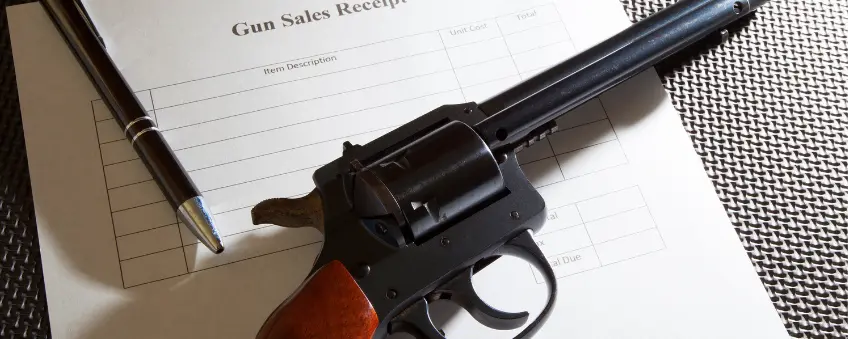
TABLE OF CONTENTS
- Getting a Hawaii FFL: An Introduction
- Step 1: Meet All of the FFL Requirements
- Step 2: Select the Type of FFL You Need
- Step 3: Complete an Online FFL Course
- Step 4: Apply for Your Hawaii FFL
- Step 5: Have an Interview with a Representative From Your Regional ATF Office
- FFL License Costs in Hawaii
- Getting a Federal Firearms License in Hawaii: Closing Thoughts
- FFL Hawaii FAQs
In 2023, there were almost 5,200 guns registered in Hawaii [1]Hawaii News Now. “Report: Nearly 52,000 guns registered in Hawaii during 2023”. Accessed September 13th, 2024.. If you want to start a business in Hawaii, you stand to make some good money. However, starting a firearms business in Hawaii involves navigating a lot of bureaucracy. You’ll have to make sure you get an FFL in Hawaii before anything. Don’t worry; if you’re looking to start a firearms business in Hawaii, read on for a clear, step-by-step guide to help you achieve your goal.
Getting a Hawaii FFL: An Introduction

Opening a firearms business in Hawaii requires getting a Federal Firearms License (FFL) from the Bureau of Alcohol, Tobacco, Firearms, and Explosives (ATF). This license grants businesses the legal ability to purchase, manufacture, and ship firearms across state lines. It also enforces record-keeping of transactions, such as seller documents and proof of buyer age. Without an FFL, you cannot operate a firearms business legally in any state. To help simplify the process, we’ve outlined five straightforward steps to obtain your Hawaii FFL.
So, if you’re in Hawaii and looking to get into the firearms industry, keep reading. We will explain exactly how to get your FFL in five easy steps.
Step 1: Meet All of the FFL Requirements
The Federal Firearms License (FFL) application and renewal processes are regulated by the Bureau of Alcohol, Tobacco, Firearms, and Explosives (ATF).
In other words, the ATF sets the baseline/minimum standards for applying for an FFL. However, states, cities, and even specific areas may also impose additional regulations, licensing, and rules. It’s important to be aware of the specific regulations in the area where you plan to start your firearms business and ensure compliance with all levels of regulations. In this guide, we will take an in-depth look at the various regulations at the federal, state, and local levels.

Federal requirements
As we touched on, the ATF sets the federal requirements you need to pass to apply for an FFL. These include things like being 21 years of age, being a United States citizen (or U.S. permanent resident), and having a clean background.

State requirements
When getting an FFL, each state has requirements that can be broken down into two main categories. Hawaii (just like any other state) could have licensing requirements (these tend to vary state by state) and absolutely will have registration requirements (these are standard across the country).
As we mentioned, licensing varies from state to state, as states have the right to impose any additional regulations they want beyond the federal requirements. Below we will break down both licensing and registration requirements in Hawaii.
State Licensing Requirements
The good news for FFL hopefuls is that Hawaii does not have any additional licensing requirements for FFL holders. However, Hawaii has implemented a number of additional licensing requirements that an individual must have in order to purchase a firearm.
That being said, as an FFL business owner, you will also need to be aware of these licensing requirements for your customers. Here are the additional requirements for your customers in order to purchase a firearm in Hawaii:
- They must contact their local police department or police chief and apply for a permit to purchase a firearm.
- They must confirm your customer has a clean criminal history, does not abuse alcohol or drugs, and is in good mental health. This information must be provided via an affidavit.
- Your customers must provide fingerprints and a photo.
- Have their doctor provide health information.
State Registration Requirements
For state registration requirements, Hawaii (along with all other states) makes you register your business with the state board before applying for your FFL. If you, as a business owner, have a gun shop or gun business in another state that is moving to or adding a location in Hawaii, you must re-register the business in Hawaii as well. So, like in all states, a requirement to get your FFL is to have a registered business.

Local and zoning requirements
It’s important to pay attention to local and zoning requirements in Hawaii due to the fact that places like Honolulu do not allow the sale of guns and firearms in residential areas. This means that if you wish to start a home-based FFL, you will be out of luck in Honolulu. No matter the state, zoning requirements typically are one of the more difficult pieces of the process to navigate, so make sure if you’re in Hawaii, you are paying close attention to all residential rules.
Step 2: Select the Type of FFL You Need
A sometimes surprisingly challenging part of the FFL process is deciding what type of FFL you need. They broke the FFLs down into three main categories:
- Manufacturer: If you plan to manufacture parts related to guns or ammunition, you would need an FFL in this category.
- Importer: They would generally consider you an importer if you’re bringing in goods from abroad. If that’s your plan, you need an FFL to suit this type of business.
- Dealer: Your business is classified as a dealer if you plan on opening a brick-and-mortar, e-commerce, or home-based FFL to sell directly to consumers.
Once you decide on your business model and what your business will look like, you will then select the FFL type that fits that plan. If you’re unsure, taking a course (see the next step) or hiring a consultant may help you narrow it down.

FFL license types
Once you’ve decided on the information above, you can hone in on what type of FFL you will need, depending on the business you are starting. You can find the full list of FFL types on the ATF website, along with their descriptions to help you better choose which is right for your business.
Step 3: Complete an Online FFL Course
For anyone looking to launch a career in the firearms business, taking an online FFL course is a great way to get ahead of the competition and opens up a lot of opportunities for success. While completing an online FFL course isn’t mandatory, it can give you an advantage over those who haven’t taken it by teaching you how to handle, store, and transfer guns with compliance in mind.
It also helps instill constructive personal habits that foster steady growth and long-term profitability. And since history has proven that the modern firearms industry has staying power, a solid grounding in safety regulations can offer years of protection from some of the complicated legal issues that are easy to overlook if you don’t take a course.
Step 4: Apply for Your Hawaii FFL
The fourth step in getting your Hawaii FFL is to actually apply. For this step, you will need to fill out the full FFL application and send it to the ATF.
You will need to provide the ATF with:
- Photographs: Used to create your FFL license.
- A completed Application for Federal Firearms License.
- Proof of business registration.
- An approved business address.
- Fingerprints: Used to conduct a criminal background check.
Step 5: Have an Interview with a Representative From Your Regional ATF Office
Once your application gets submitted, your local ATF agency will arrange a meeting between you and an IOI. An IOI, also known as an Industry Operations Investigator, will meet with you to make sure you fully understand all federal regulations.[2]ATF. “Industry Operations Investigators” September 13, 2024. They will also review your business plans to confirm aspects of your submitted application. After this meeting, the IOI will either recommend you for an FFL, or will not.
FFL License Costs in Hawaii
FFL costs are regulated by the ATF, so they are the same across the country. That said, the cost of each FFL license will vary. The FFL costs range in price from $30 to $3,000 and are valid for three years. Following the three-year mark, you will need to renew your FFL, and the renewal will cost the same amount – anywhere from $30 to $3,000.
Getting a Federal Firearms License in Hawaii: Closing Thoughts

Getting an FFL in Hawaii is relatively simple and straightforward. The things you’ll need to pay the most attention to include your chosen location for your operation and the customer requirements you’ll need to watch for. You’ll also need to find a payment processor to accept payment from your customers.
Unfortunately, a lot of payment processors won’t work with businesses in the firearms industry because it’s considered high-risk. The good news is that PaymentCloud specializes in working with high-risk merchants. Open a merchant account today to reap the benefits of firearm-friendly payment processing. If starting a firearms business is your dream, you won’t have a problem bringing it to life in Hawaii.
Have you not been able to get a deal approved?
Your troubles of getting approved are over!
Approval
Rating
FFL Hawaii FAQs
Do I need an FFL in Hawaii?
Yes, if you wish to do business importing, manufacturing, or dealing firearms. An FFL is federally required for all individuals who plan to start a business in the firearms industry. An FFL is not required, on the other hand, for a consumer weapon purchase.
Who can apply for an FFL in Hawaii?
Any individual who is eligible based on the federal requirements can apply for an FFL.
Do I need to register as a business to get a Hawaii FFL?
Yes, you will need to register your business with the state of Hawaii. Registering your business is required whether your business is brand new or you are moving an existing business from the mainland to Hawaii.
How can I find an FFL dealer in Hawaii?
If you’re looking to purchase a firearm in Hawaii, the first thing you should do is find an FFL dealer near you. To do this, search for Federal Firearms Licensees near you on the U.S. Bureau of Alcohol, Tobacco, Firearms and Explosives website.
You can search for an FFL based on state and type of license, so make sure to select “Hawaii” when searching for an FFL. Once their list populates, you can call and inquire about their services, inventory, and prices. Ask if they have any special requirements before buying a firearm, such as background checks or permit fees, and research their feedback online to get an accurate impression of the company and its services. This will allow you to narrow down your choices and find the right FFL dealer that fits your needs perfectly.
Can you have a home-based FFL in Hawaii?
Having a home-based FFL in Hawaii will depend on your location. You will need to check with your local government to see what gun rules and restrictions they have. Honolulu, for example, has a strict no-sale of ammunition or firearms in residential areas, making it impossible to have a home-based FFL.
Can I apply for an FFL with a Hawaii gun trust?
A gun trust does not allow you to apply for an FFL. It is a business license issued to an individual, and a gun trust is not a business or individual. However, a Hawaii gun trust may allow you to apply for an FFL transfer. To put it differently, a gun trust can purchase and own weapons but cannot have a business selling them.
Does the BATF&E have requirements for an FFL in Hawaii?
Yes, the BATF&E is the federal organization in charge of regulating FFLs (also known as the ATF). They set all the baseline federal requirements and regulations. State and local governments can then impose additional regulations.
Do I need to apply for an SOT for my Hawaii FFL?
Applying to become a special occupancy taxpayer will only be necessary if you plan to deal with NFA-style weapons.
How long does it take to get your FFL in Hawaii?
The FFL application process is relatively quick. Once you have submitted your application, you should have an answer within 60 days. The more time-consuming aspect of getting your FFL will be getting your business model together along with all of the required paperwork.
How can I transfer an FFL in Hawaii?
You cannot transfer an FFL. All individuals who want to take part in the firearms industry must apply for their own FFL. Check the full list of NFA items on the ATF website.
How much does an FFL transfer cost in Hawaii?
The cost varies depending on the retailer and gun type but usually runs from $30-100.
How hard is it to get an FFL in Hawaii?
Getting an FFL in Hawaii is very achievable. They do not have additional state licensing, which is a benefit of getting an FFL in Hawaii. However, they do have many local and city requirements. This can make the process much more difficult if you’re in one of the areas with these restrictions. However, if you are able to pick the location of your business or are not set on a particular area, you should be able to find a location with fewer regulations, making the FFL process quicker and easier.



